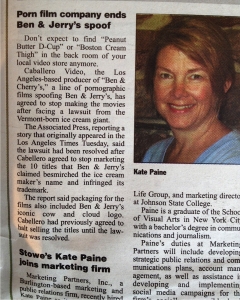So your business story made the newspaper but it’s wrong. At least that’s how you may see it when something you’ve said has come back to haunt you. Or, perhaps there was a fact, date or name that was incorrect.
Clients sometimes ask if we would request that a news editor retract a story in which they have been quoted. It was out of context, they thought, or they feel it shows them in an unfavorable light. After reviewing the article – always keeping the client’s best interests at heart in balance with media realities – we assess whether asking for a retraction or even a correction is or is not appropriate.
It can happen to anyone
Interestingly, something similar happened to me recently. The announcement of my new job here at Marketing Partners was posted in a local newspaper. While there was no part of the announcement or use of my photo that was in error, it was placed next to a headline, which at first glance, was quite, shall we say “eye-catching.” Fortunately, I have a solid sense of humor.
 As seen to the left of my photo, it looks like I’m somehow connected with the headline: “Porn film company ends Ben & Jerry’s spoof.” In the days following publication, I received some pretty funny text and email messages from good-humored friends and colleagues. (Author’s note: In the paper’s defense, see headline below the Ben & Jerry’s article which reads: “Stowe’s Kate Paine joins marketing firm.” Whew.)
As seen to the left of my photo, it looks like I’m somehow connected with the headline: “Porn film company ends Ben & Jerry’s spoof.” In the days following publication, I received some pretty funny text and email messages from good-humored friends and colleagues. (Author’s note: In the paper’s defense, see headline below the Ben & Jerry’s article which reads: “Stowe’s Kate Paine joins marketing firm.” Whew.)
I laughed, jokes flew back and forth for a few days and on I went about my daily business. Sometimes, clients may have to do the same even if it’s not as humorous a situation as mine. Here’s why: having your story appear in the newspaper has added value to you and your business. We, in the marketing communications business refer to it as “earned media” – which means you earned the attention of the media outlet. A staff-generated story is not paid for, which means you have not paid (for advertising) to control the message. Usually you’ll be pleased with the story and, let’s face it, sometimes you’re simply not going to be happy. It’s inevitable.
Retraction, defined
Before we look at some helpful ways to manage an awkward situation, let’s define the meaning of a “retraction” (from the standpoint of the media). As defined by The Concise Oxford Dictionary, Ninth Edition, the definition, in part, says: “withdraw or revoke (a statement or undertaking).” In other words, when asking the media for a retraction, it means they have to admit responsibility for any and all errors. It’s the means by which the media admits their mistake and takes back what they published so the public will see their error wasn’t purposeful.
Stepping back for a moment, let’s not confuse a “retraction” with a “correction.” Newspapers are usually willing to print corrections when the facts, as presented in the original story, are proven to be inaccurate. In a 2005 New York Times article by the late William Safire, he wrote: “A ‘correction’ is a retraction without all the nervous groveling. It deals with facts rather than judgments; in journalistic usage, a ‘correction’ sets right an inaccuracy.” Spot on, Mr. Safire.
What do news editors think?
Recent client requests made me dig into this topic a little deeper to see what current thinking is locally. I checked in with some contacts in the Vermont media to see what, if any, thoughts they had relative to retractions and/or corrections. It is no surprise that Vermont editors or news directors consider each request on a case-by-case basis.
“We publish corrections or clarifications only if we are able to verify that an article we’ve published contains information that is factually inaccurate,” says Matt Kanner, managing editor of The Stowe Reporter. “If we are approached with a request for a retraction or correction, we independently assess whether the request is valid and whether a correction is warranted.”
The Burlington Free Press echoes that policy but emphasizes addressing the situation as soon as possible. “If a clarification and correction are due, we promptly respond,” explains Editor Michael Townsend. “Speed is of the essence. We do not want to perpetuate the error in future stories. We’ll listen to the source, vet the story with a reporter and make a determination.”
In my very unscientific research, retractions do not occur too often. Corrections, however, are more common due in part to our 24/7-news cycle and the social media culture. There is a tendency, especially if you’re a public figure or well-known member of the community who has a relationship with the reporter, to speak more informally during an interview and as a result, you may say something in a way that wasn’t intentional and could be taken out of context by the public.
This is where your marketing communications team can help prepare you to handle a “hiccup” after publication or broadcast or to prevent worrisome “trip-ups” in the future.




And now, from the Wall Street Journal, we have “clarifications”……….